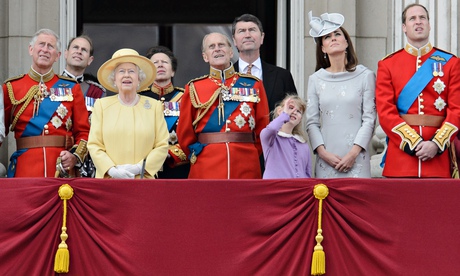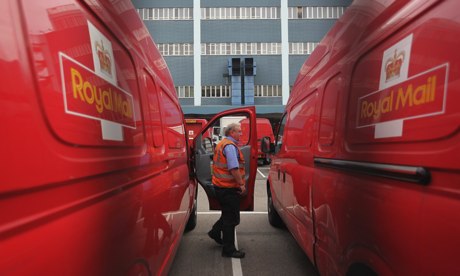
The royal family gathered on the balcony at Buckingham Palace. The public accounts committee has questioned how well the royal finances are administered. Photograph: Leon Neal/AFP/Getty Images
When you are on a limited income, a boiler packing up, a leaky roof, dodgy guttering or a basement full of asbestos can tip you over the edge. If you are mortgaged-up, you cannot let your property fall into disrepair. If you live in social housing or are renting privately, you may find you receive little help; landlords and councils will keep you waiting and do the bare minimum. Rising food and fuel bills mean that, despite our much-trumpeted growth, too many are left with the "heat or eat" dilemma.
So can you imagine what it is like to be the poor old Queen? The boiler in Buckingham Palace is 60 years old. And you will get no Camilla cracks from me: I've moved on.
What, though, is the Queen to do? Obviously the answer is not pay for it herself out of her own enormous fortune because … well, she is the Queen. We – her largely indifferent subjects – should be ecstatically happy to pay for her repairs. Instead, though, "we" – in the shape of the public accounts committee headed by Margaret Hodge – are nosing round asking awkward questions about the royal finances, which is really rather vulgar. It is "bizarre", Jacob Rees-Mogg has told us, that this committee should query the pittance of royal expenditure when we should be looking at cutting other public spending.
It's not that bizarre, as every public body has had to trim itself down, or at least not flash the cash around quite so obviously, in the middle of a recession. The royals, though, have maintained staffing levels and those staff have carried on spending, cutting only 5% over the last six years. Last year, the monarch received a sovereign grant of £31m and the family can raise money when they choose to. They only open up Buckingham Place for tourists two months of the year, even though they were advised years ago to keep it open longer. Nonetheless, via entry fees and renting it out to JP Morgan, they made £11.6m last year.
Still, everyone loves our dutiful Queen and republicanism remains at a low ebb. But I wonder, as she hands over more duties to Prince Charles, and Kate and sprog will have to be wheeled out more, whether this spectacle will continue to persuade us on the "value for money" front. Which is surely why that expert in fairness and accountability George Osborne has intervened. Why should the royals have to dip into their million-pound emergency fund to repair their own palaces? Gideon feels the committee "is being unfair to the way the royal household has managed its finances".
The inimitable Nadine Dorries has also been on the case. She feels embarrassed "listening to Margaret Hodge reel off the list of repairs that need doing to royal buildings". Nadine embarrassed? This is serious. She then surpassed herself by saying: "What the royal family does for us is beyond explanation."
Indeed. Why is the Treasury stepping in here, except to defend, as ever, the super rich? While the number of the undeserving poor grow – scroungers, shirkers, people who steal food that has been thrown away out of skips – it is no coincidence that the number of deserving rich expands.
This is Conservative ideology at full throttle. We cannot increase tax on those with big incomes because they are the motors of growth and may leave. We are simply to accept that such concentrated wealth is a global trend. To say otherwise is some kind of anti-business communism. The anger towards bankers as the undeserving rich has dissipated as we are fed constant tales of vital entrepreneurs. Those at the top should not have to open their books, as they themselves are an actual asset. The vastly wealthy are now called "wealth creators".
The monarchy is part of this charade and we are to be grateful as we pay £1m to do up the house of the Duke and Duchess of Cambridge. Or rehouse Princess Beatrice. We provide the help to buy. We pay for their DIY, but they need more.
At the very least, one would have thought that the palace and its Tory courtiers would want to appear more frugal. Instead, the royal energy bill is that of the average British household. Multiplied 2,280 times. This kind of spending, and the apologists for it, fail to acknowledge a world of foodbanks and steep decline in social mobility. For if anything symbolises stagnation, immovable social barriers and hierarchy, it is the royal family. They embody the exact opposite of hard work, aspiration and innovation and all the guff that we are told will make things fairer.
Of course the chancellor defends those born with enormous financial assets. This government, after all, bought the American model that extreme and visible inequality is a price worth paying for the dream of social mobility.
The reality is different. We actually subsidise those born to rule at a time of gross inequality and zilch mobility. These people have no shame. They believe themselves to be the deserving rich. So put your hands in your pockets to mend the ancient boilers of billionaires. And feel thankful. Yes, this really is "beyond explanation".











 154 Comments
154 Comments
